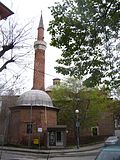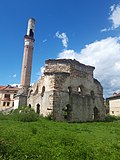| Name | Location | Year | Image |
|---|
| Kodzha Mahmut Pasha Mosque | Sofia, Saborna street, 2 | 15th century (1451 – 1494) [1] |  |
| Banya Bashi Mosque | Sofia, Marie Louise Boulevard, 18 | 16th century (1576) [2] |  |
| Dzhumaya Mosque | Plovdiv | 14th century (1363–64) - 15th century (1421-1451) [3] |  |
| Imaret Mosque | Plovdiv | 15th century (1444 - 1445) [4] |  |
| Tashkopryu Mosque | Plovdiv | 19th century (1860) [5] |  |
| Hayrie mosque | Varna | 19th century (1835) [6] | |
| Azizie mosque | Varna | 19th century (1869) [7] | |
| Said Pasha Mosque | Ruse | 19th century (1839 - 1840) [8] |  |
| Eski Mosque | Stara Zagora | 15th century [9] |  |
| Tombul Mosque | Shumen | 18th century (1740 - 1744) [10] [11] |  |
| Eski Mosque | Haskovo | 14th century (1394) [12] |  |
| Charshi Mosque | Haskovo | 18th century (1785) [13] |  |
| Eski Mosque | Yambol | 14th century (1373) [14] |  |
| Kurshumlu Mosque | Pazardzhik | 16th century (1574 ) [15] |  |
| Blagoevgrad Mosque | Blagoevgrad | 19th century [16] | |
| Eski Mosque | Vratsa | 18th century (1786 or earlier) [17] |  |
| Osman Pazvantouglu Mosque | Vidin | 19th century (1801) [18] |  |
| Eski Mosque | Kazanlak | 14th century (1394 - 1412) [19] |  |
| Fatih Mehmed Mosque | Kyustendil | 15th century (middle of 15th century) [20] |  |
| Ahmed Bey Mosque | Kyustendil | 15th century (middle of 15th century) [21] |  |
| Kardzhali Mosque | Kardzhali | 19th century (1812 rebuilt 1874) [22] |  |
| Sahat Mosque | Targovishte | 18th century (1722 ) [23] | |
| Eski Mosque(Tyurmeto) | Dupnitsa | 15th century (late 15th century) [24] |  |
| Ibrahim Pasha Mosque | Razgrad | 17th century (1616-1617) [25] |  |
| Ahmed Bey Mosque | Razgrad | 16th century (1542-1543 or 1557-1558 ) [26] |  |
| Kurshumlu Mosque | Silistra | 17th century (first half) [27] |  |
| Bayrakli Mosque | Samokov | 19th century (1845) [28] |  |
| Kurshum Mosque | Karlovo | 15th century (1485 -1486 ) [29] |  |
| Karadzha Pasha Mosque | Gotse Delchev | 15th century (second half of 15th century ) [30] |  |
| Old Peshtera Mosque | Gotse Delchev | 17th century (1650 ) [31] |  |
| Yusuf Bey Mosque | Provadia | 17th century (1623) [32] | |
| Sultan bayazid Veli Mosque | Aytos | 15th century (1435 ) [33] [34] |  |
| Black Mosque | Karnobat | 19th century (1821) [35] | |
| Central Mosque | Krichim | 19th century (1800) [36] | |
| Eski Mosque | Momchilgrad | 17th century [37] | |
| Hadzi Hyuseyin Mosque | Belogradchik | 18th century (1751) [38] |  |
| Seytlyar Mosque | Krumovgrad | 20th century (1901) [39] |  |
| Ardino Mosque | Ardino | 15th century [40] |  |
| Dzhebel Mosque | Dzhebel | 18th century (1712 [41] or 1789 [42] ) | |
|





























